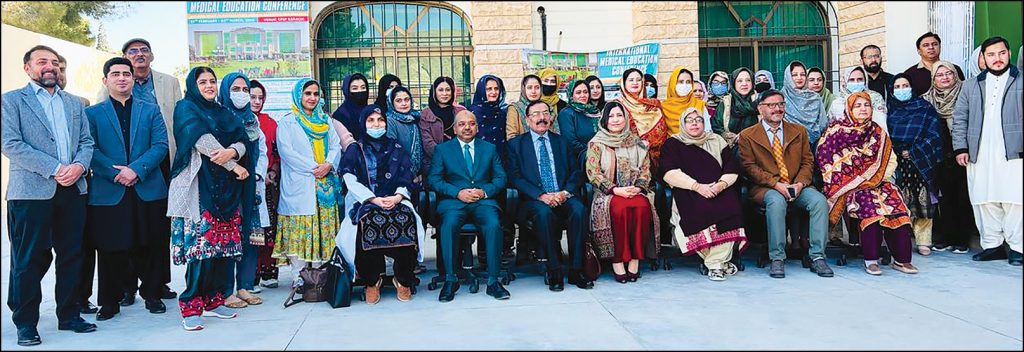QUETTA: A Pre-conference workshop in connection with “International Conference on Medical Education” organized by College of Physicians & Surgeons Held from 29th Feb to 3rd Mar 2024 was organized here at the CPSP Quetta on 24th Feb, 2024. The facilitator was Dr. Mukhtar Mehboob Consultant Surgeon & Head of Surgery Department Mohtarma Shaheed Benazir Bhutto General Hospital Quetta. The co-facilitators were Dr. Fazal Dad Kakar Associate Professor Oral Biology and Dr. Mahwash Mansoor Associate Professor Radiology Bolan Medical College Quetta. The workshop was attended by faculty members and postgraduate trainees.

Group photo of participants and facilitators in the workshop shows from (L to R) Dr. Sughra Mujeeb, Dr. Rehana Kamal, Dr. Mukhtar Mehboob facilitator of workshop, Prof. Zafar Tanveer Principal QIMS Chief guest, Prof. Ayesha
Siddiqa Vice President & Regional director CPSP Quetta
Prof. Rukhsana Majeed, Dr. Fazal Dad Kakar and Dr. Mahwash Mansoo.
Workplace Based Assessment it may be mentioned here is a real time assessment for post-graduate medical trainees. Postgraduate Medical Institute must ensure Workplace Based Assessment in clinical setting.
Dr. Mukhtar Mehboob in his presentation pointed out that WPBA is a true and holistic measure of competence of learner in working milieu. It is the ability to perform relevant clinical tasks in the context of the social environment in order to resolve health problems of individuals in an efficient, effective, economic and humane manner. The need of assessment was highlighted in reference to patient safety, standard of care, trainees’ development and to ensure we are doing correctly. The emphasis was laid on formative assessment of postgraduate trainee. The desired competencies from novice to expert levels were described and discussed with participants. In postgraduate trainee, the level of Competence from active sense of responsibility to decision making in professional way would be the target of training. George Miller, an American cognitive psychologist “Miller’s Pyramid” and WPBA at Does level was described in detail.
The participants were advised to read Miller’s two books “Language and Communication” and “The Magical Number Seven, Plus or Minus Two”. These books highlight the importance of communication skills and how two improve cognition skill. WPBA assess all domains of knowledge that is cognition, affection and psychomotor skill. Knowledge is the basics of WPBA. Knowledge translates into habituation and habituation leads to action. The real time assessment of action is WPBA. WPBA must have cost effective, reliable, acceptable, valid and educational values.
The WPBA can be performed without much disruption in usual work and addresses ethical & legal issues in practice. It is learner centric, assess different types of cases and assess higher type of thinking. The feedback on WPBA highlights the strengths and weaknesses and enables to decide further action plan. The criteria for faculty members WPBA were also discussed. The parameters were number of trainees in program, academic performance of incoming/outgoing residents, research published by residents/ teachers, award won by residents/ teachers, examination score of trainees and accreditation by 3rd party.
Prof. Mukhtar then discussed the need for global standardization by World Federation of Medical Education. The session was motivated to differentiate the gap between current understanding and desired performance of WPBA. The tools for WPBA were described with their strengths and weaknesses. The Mini Clinical Evaluation Exercise (Mini-CEX) and Direct Observational Procedural Skill (DOPS) were also described in detail with hands on exercises. The need of Educational Portfolio as a part of postgraduate training was highlighted. Faculty members endorsed the suggestion that educational portfolio should be mandatory. The other tools were also discussed like Case-based discussion (CBD), Multi-source feedback (MSF), Professionalism mini-evaluation exercise (P- MEX) and E-Log Book. Beside Clinical Supervisor Report (CSR) the role of Educational Supervisor for every teaching institute was also highlighted. The participants suggested that there should be an Educational Supervisor to monitor trainees and trainers.
Dr. Mahwash Mansoor described the Mini-CEX. She said that it is a15 minute snap shot of doctor-patient interaction with five minutes feedback Assessment in real life setting. It assesses attitude, behavior & clinical skill. She stressed upon different assessors for different clinical encounter. She further pointed out that Mini-CEX covers the competencies of history taking, physical examination, communication skills, organization, clinical judgment, efficiency and professionalism. She was of the view that it can be performed in different clinical settings and has high satisfaction of both assessors and accesses. She presented the valuable short and informative videos describing the whole sequence of Mini-CEX, the “Sandwich” and “Pendleton technique” of feedback. The Mini-CEX demonstration was performed by Prof. Zaib-un-Nisa Magsi with postgraduate trainees.
Dr. Fazal Dad Kakar described the concept of DOPS. He said that trainee choose the time and procedure. The procedure should span in time of 15-20 minutes and followed by feedback of five minutes. The assessor checks according to check list. The assessor marked on generic score sheet (overall aspects viewed) and specific score sheet ( for specific procedure). DOPS observes psychomotor skills in parallel with behavior. The behavior observed are either trainee obtaining informed consent, how was communication skills, appropriate analgesia or safe sedation, demonstrating indications, relevant anatomy aseptic techniques and procedure. The range of skills from simple to complex was assessed by different assessors.
The feedback has high educational value. The DOPS demonstration was performed by Dr. Mukhtar Mehboob and their postgraduate trainees. The workshop concluded that period of proto-professionalism should be attainment leading to phronesis rather than attrition leading to cynicism. Workplace-based assessments should be part of a structured program of teaching that is designed for doctors in training and in each clinical setting.
Earlier Vice President CPSP & Regional Director of CPSP Prof. Ayesha Siddiqa in her welcome address highlighted the efforts made by CPSP in organizing and standardizing the postgraduate medical training. She emphasized the need of professionalism in medical graduates and postgraduate training. She emphasized the importance of maintaining the E.log book of CPSP by both postgraduate trainees and supervisors.



